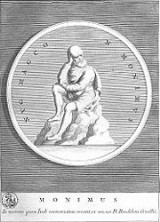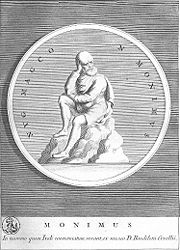
Monimus
Encyclopedia

Syracuse, Italy
Syracuse is a historic city in Sicily, the capital of the province of Syracuse. The city is notable for its rich Greek history, culture, amphitheatres, architecture, and as the birthplace of the preeminent mathematician and engineer Archimedes. This 2,700-year-old city played a key role in...
, was a Cynic philosopher.
According to Diogenes Laërtius
Diogenes Laertius
Diogenes Laertius was a biographer of the Greek philosophers. Nothing is known about his life, but his surviving Lives and Opinions of Eminent Philosophers is one of the principal surviving sources for the history of Greek philosophy.-Life:Nothing is definitively known about his life...
, Monimus was the slave of a Corinth
Corinth
Corinth is a city and former municipality in Corinthia, Peloponnese, Greece. Since the 2011 local government reform it is part of the municipality Corinth, of which it is the seat and a municipal unit...
ian money-changer who heard tales about Diogenes of Sinope
Diogenes of Sinope
Diogenes the Cynic was a Greek philosopher and one of the founders of Cynic philosophy. Also known as Diogenes of Sinope , he was born in Sinope , an Ionian colony on the Black Sea , in 412 or 404 BCE and died at Corinth in 323 BCE.Diogenes of Sinope was a controversial figure...
from Xeniades
Xeniades
Xeniades was the name of two people from Corinth who lived in the time of Ancient Greece:#A Greek philosopher from Corinth who lived in the time of Democritus, c. 400 BC...
, Diogenes' master. In order that he might become the pupil of Diogenes, Monimus feigned madness by throwing money
Money
Money is any object or record that is generally accepted as payment for goods and services and repayment of debts in a given country or socio-economic context. The main functions of money are distinguished as: a medium of exchange; a unit of account; a store of value; and, occasionally in the past,...
around until his master discarded him. Monimus also became acquainted with Crates of Thebes
Crates of Thebes
Crates of Thebes, was a Cynic philosopher. Crates gave away his money to live a life of poverty on the streets of Athens. He married Hipparchia of Maroneia who lived in the same manner that he did. Respected by the people of Athens, he is remembered for being the teacher of Zeno of Citium, the...
.
He was famous for saying that "everything is vanity," (tuphos, literally 'mist' or 'smoke'). According to Sextus Empiricus
Sextus Empiricus
Sextus Empiricus , was a physician and philosopher, and has been variously reported to have lived in Alexandria, Rome, or Athens. His philosophical work is the most complete surviving account of ancient Greek and Roman skepticism....
, Monimus was like Anaxarchus
Anaxarchus
Anaxarchus was a Greek philosopher of the school of Democritus. Together with Pyrrho, he accompanied Alexander the Great into Asia. The reports of his philosophical views suggest that he was a forerunner of the Greek skeptics.-Life:...
, because they "compared existing things to a scene-painting and supposed them to resemble the impressions experienced in sleep or madness." He said that "it was better to lack sight than education, because under the first affliction, you fall to the ground, under the latter, deep underground," and he also said that "Wealth is the vomiting of Fortune."
He wrote two books: On Impulses, and an Exhortation to Philosophy, and he also wrote some jests mixed with serious themes, (presumably related to Cynic-style spoudogeloia
Spoudaiogeloion
The mixture of serious and comical elements stylistically, from the Greek spoudaion, "serious", and geloion, "comical". The combination first appears in Aristophanes's Frogs....
).

